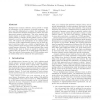Free Online Productivity Tools
i2Speak
i2Symbol
i2OCR
iTex2Img
iWeb2Print
iWeb2Shot
i2Type
iPdf2Split
iPdf2Merge
i2Bopomofo
i2Arabic
i2Style
i2Image
i2PDF
iLatex2Rtf
Sci2ools
ASPLOS
1991
ACM
1991
ACM
NUMA Policies and Their Relation to Memory Architecture
Multiprocessor memory reference traces provide a wealth of information on the behavior of parallel programs. We have used this information to explore the relationship between kernel-based NUMA management policies and multiprocessor memory architecture. Our trace analysis techniques employ an off-line, optimal cost policy as a baseline against which to compare on-line policies, and as a policyinsensitive tool for evaluating architectural design alternatives. We compare the performance of our optimal policy with that of three implementable policies (two of which appear in previous work), on a variety of applications, with varying relative speeds for page moves and local, global, and remote memory references. Our results indicate that a good NUMA policy must be chosen to match its machine, and confirm that such policies can be both simple and effective. They also indicate that programs for NUMA machines must be written with care to obtain the best performance.
ASPLOS 1991 | Memory References | Multiprocessor Memory | NUMA Management Policies | Programming Languages |
Related Content
| Added | 27 Aug 2010 |
| Updated | 27 Aug 2010 |
| Type | Conference |
| Year | 1991 |
| Where | ASPLOS |
| Authors | William J. Bolosky, Michael L. Scott, Robert P. Fitzgerald, Robert J. Fowler, Alan L. Cox |
Comments (0)

